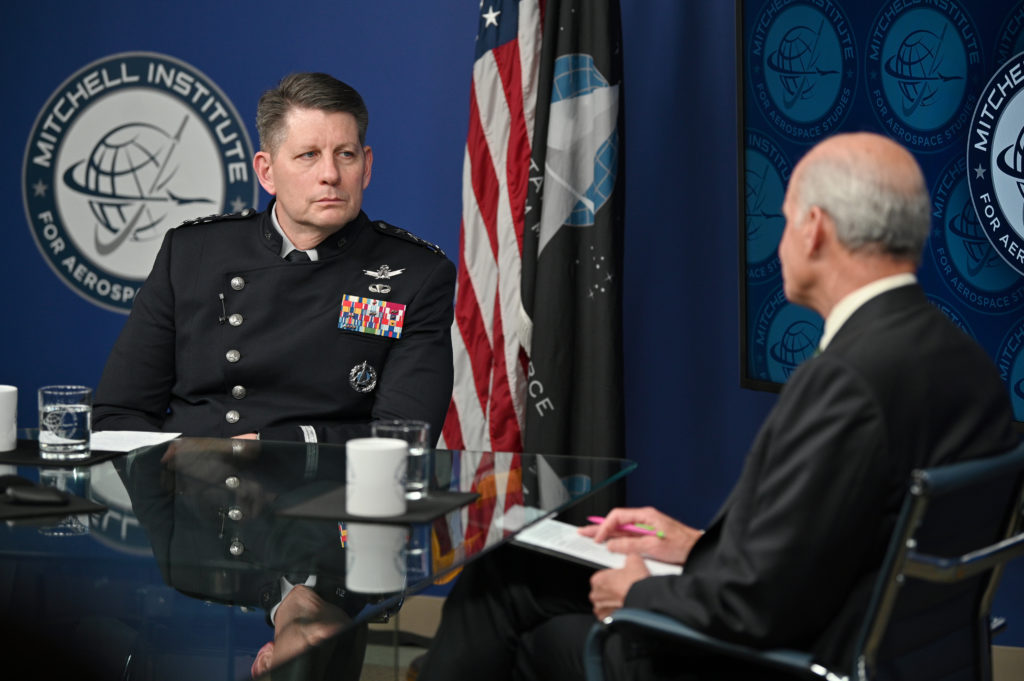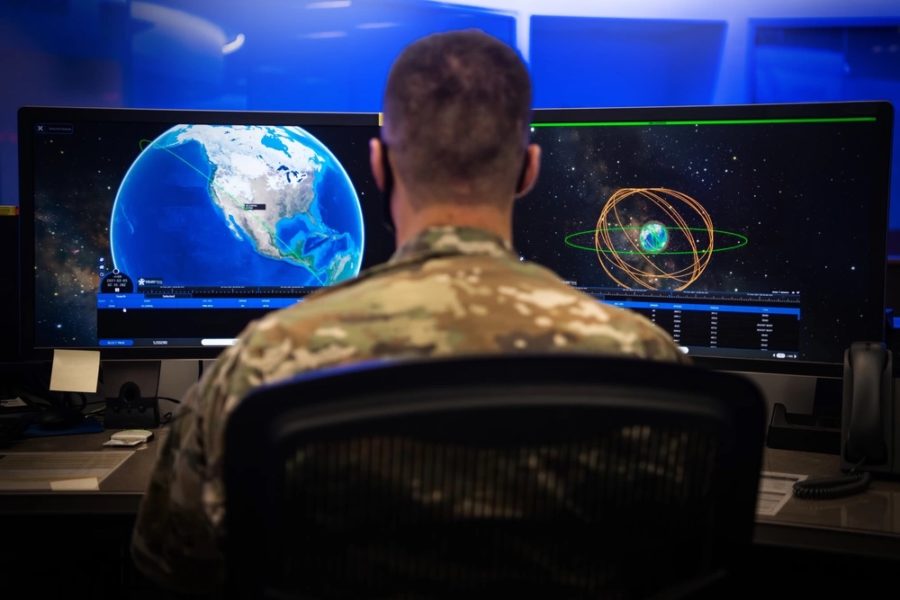In its official song, the Space Force touts itself as a ‘mighty watchful eye’ keeping watch on both the Earth and space—and the service now has what it needs to live up to that description and avoid any surprise attack, Vice Chief of Space Operations Gen. David D. Thompson said June 12.
“We’ve gotten to the point where we now have the tools: they’re there, they are either in place or building up,” Thompson said in a livestreamed discussion with retired Gen. Kevin Chilton, Explorer Chair at the Mitchell Institute’s Spacepower Advantage Center of Excellence. “If we’re operationally or strategically surprised, shame on us.”
Thompson’s remarks came in response to a question from Chilton on how the Space Force plans to avoid a “space Pearl Harbor,” where an adversary might attempt an operational or strategic surprise in the space domain, on the ground, or in cyberspace.
The Space Force has several capabilities which Thompson said would make it difficult for an adversary to get the drop on the U.S., including an operationally- and tactically-focused space intelligence enterprise; a broad understanding of space domain awareness; joint cyber defense forces; and the branch’s emerging ground moving target indicator capability.
“It’s not just in space, but there is soon to be nowhere on the globe where we won’t be able to see, sense, monitor and take action as required,” Thompson said.
When the Space Force first launched in December 2019, the U.S. government lacked a space intelligence enterprise that was operationally and tactically-focused, Thompson said. There was a robust strategic space intelligence enterprise in the form of the National Air and Space Intelligence Center, but Space Force leaders sought to make the budding service the 18th member of the Intelligence Community, and one that tracks not only the technical details of foreign space capabilities, but also their doctrine, training, methods of employment, and the development of counter-tactics.
“That is probably the first thing that we needed to do and are doing well,” Thompson said.
Underscoring Thompson’s point, the House Armed Services intelligence and special operations subcommittee proposed establishing the National Space Intelligence Center as a field operating agency of the Space Force. The center would “analyze and produce scientific and technical intelligence on space-based and counterspace threats from foreign adversaries,” according to markup language for the 2024 National Defense Authorization Act.
The National Space Intelligence Center already exists in the form of Space Delta 18, which was launched in June 2022. Establishing the center as a field operating agency would give it the authority to conduct field activities “beyond the scope of any of the major commands” according to the Air Force definition of such agencies.
The second important factor Thompson listed is a new understanding of space domain awareness, one which focuses on possible threats rather than “managing the traffic,” he said. The military is in the process of shifting responsibility for overseeing safe space flight for civil and commercial satellite operators to the civilian Office of Space Commerce.
The third factor is the military-wide build up of cyber defense forces, which should prevent adversaries from gaining the element of surprise in that domain, Thompson said.
The general emphasized effective space domain awareness involves not only detecting suspicious behavior in space but also determining what party was responsible for that behavior. Thompson praised U.S. Space Command for publicly criticizing bad behavior, such as Russia’s 2021 anti-satellite test, which created a dangerous debris field in orbit.
“Calling out those sorts of behavior and making sure that people understand we can and will observe and attribute,” is an important part of maintaining order in space, he said. But space is not the only domain under Space Force’s eye. As the branch takes on the mission of ground moving target indication, the goal is for the U.S. to able to observe and call out bad behavior anywhere on or above the planet.

As the government and private sector expand into cislunar space, the vast area between geosynchronous orbit and the moon, so too will Space Force surveillance. The 19th Space Defense Squadron is specifically tasked with cislunar and extra-geosynchronous domain awareness.
“Our role is space domain awareness and that starts … as low as satellites can operate and goes to infinity,” Thompson said. “As the human race continues to expand out into the solar system and beyond, we believe our responsibility is to understand what is happening in the domain.”
Beyond the Space Force’s observational capabilities, Thompson also highlighted the service’s work on satellite proliferation as key to preventing a devastating surprise attack. Though proliferation is often used in the context of large numbers of satellites, Thompson noted it also refers to distributing capabilities across multiple orbital regimes, multiple domains, and multiple partners.
“The first thing you do is distribute those capabilities across multiple [orbits], which means that an adversary, if they’re going to attack you in space, has to have a very sophisticated and synchronized means of attacking,” he said. “The second is that you look at ways to augment and/or perform the mission in other domains—air, maritime, cyberspace—such that it is not just space that is the way by which missions are executed.”
It also helps to distribute capabilities among allies, partners, and even commercial services so that an adversary seeking to target those capabilities might say “even if I execute the way I want to, I’m unlikely to have the desired effect,” Thompson said.
However, growing these capabilities to keep up with demand requires hardware and manpower, and Chilton noted that acquiring more of both would become difficult under a defense budget which may face slower growth over the next few years. Thompson said the Space Force has been “blessed” to enjoy double-digit budget growth over the past several years, but he agreed a lean future could inhibit the branch’s ability to keep pace with its expanding mission.
“Either the department may need to look at its priorities for various investments, or we will have to throttle the growth that we have seen and the delivery of capabilities,” he said. “It will simply be incumbent on us to make sure that our leaders inside the Department of Defense and in the White House and Congress understand the risks we’ll take if in fact we cannot continue that.”
